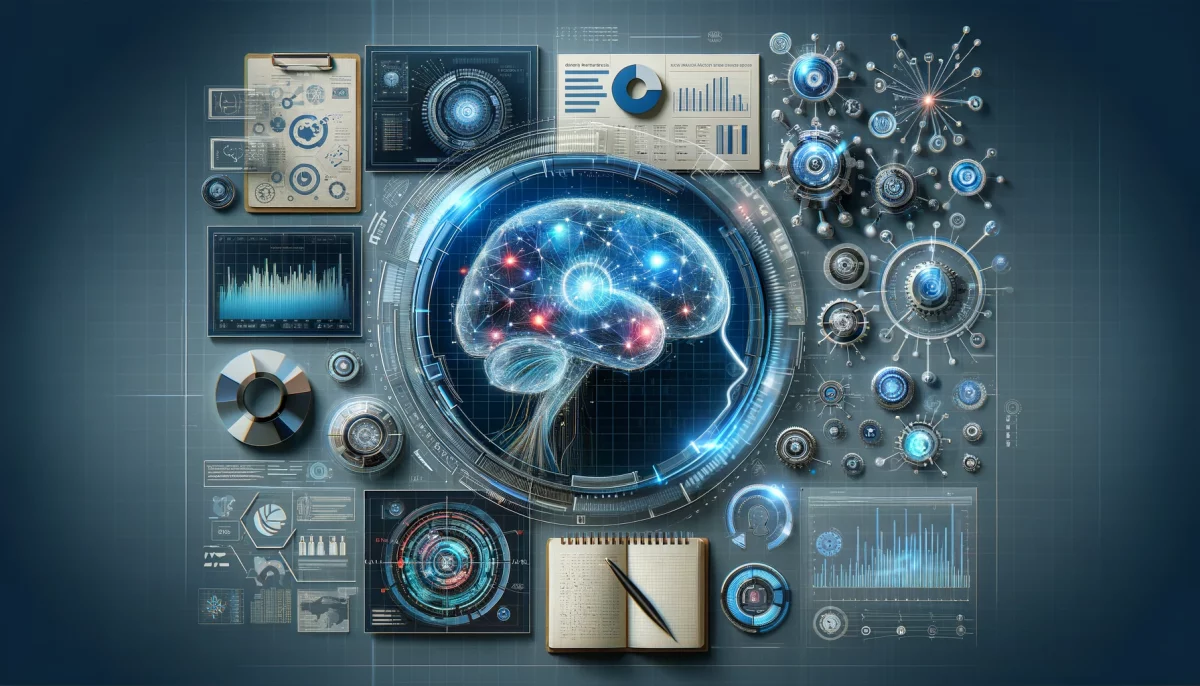Imagine a scene from the near future: A project manager, her eyes scanning over a Gantt chart that could pass for a modern masterpiece, sits at her desk. Beside her, an AI assistant is not just a passive tool but an active participant, offering not just reminders or updates but deep, strategic insights gleaned from the analysis of thousands of similar projects. This scenario isn’t plucked from a sci-fi novel; it’s a vivid illustration of the revolutionary role AI is playing in Project Management.
In this article, we’re diving into the heart of how artificial intelligence is not just altering but expanding the horizons of project management. We’ll see how AI is moving beyond the mundane, automating the routine, and stepping into a realm previously unimagined – providing predictive analytics that don’t just streamline processes but transform them. It’s a journey into a world where AI’s capabilities in project management are not just an add-on but a game-changer, saving time, conserving resources, and opening new avenues for efficiency and creativity.
The AI Transformation: More Than Just Automation
Artificial Intelligence is often synonymous with automation, but in project management, its capabilities extend far beyond that. AI can sift through vast amounts of data to provide actionable insights, predict potential roadblocks, and even recommend adjustments to project timelines.
Data-Driven Decision Making
In traditional project management, decisions are often made based on experience, intuition, or both. While these methods have their merits, they are not foolproof. AI algorithms can analyze historical data, current trends, and social signals to make more informed decisions. For example, AI can predict the success rate of a project based on similar past projects, allowing project managers to allocate resources more efficiently.
Predictive Analytics for Proactive Management
Being reactive in project management can lead to delays and cost overruns. AI’s predictive analytics capabilities enable project managers to be proactive. By analyzing patterns and trends, AI can forecast potential issues before they become critical problems. This foresight allows for timely interventions, reducing the risk of project failure.
Empowering Team Collaboration with AI
In any project, effective team collaboration is crucial for success. AI takes this further by enhancing communication, task allocation, and overall team dynamics.
AI-Enhanced Communication
Communication is the backbone of any project. AI chatbots and virtual assistants can facilitate seamless communication among team members. These AI tools can schedule meetings, send reminders, and even translate messages in real time, making it easier for globally dispersed teams to collaborate.
Intelligent Task Allocation
AI algorithms can analyze team members’ skills, past performance, and workload to intelligently allocate tasks. This ensures that the right person is working on the right task at the right time, optimizing productivity and reducing the risk of delays.
Navigating Risks with AI’s Foresight
Risk is an inherent part of any project. However, AI’s predictive capabilities can significantly mitigate these risks.
Risk Identification and Assessment
AI can scan through project data to identify potential risks that might not be apparent to the human eye. Once identified, AI tools can assess the severity of these risks and suggest mitigation strategies.
Real-Time Risk Monitoring
Traditional risk monitoring often involves periodic reviews, which may not be sufficient in a fast-paced project environment. AI can provide real-time risk monitoring, alerting project managers when a risk factor crosses a predetermined threshold.
Optimizing Resource Allocation with AI
Resource allocation is a balancing act that can make or break a project. AI offers sophisticated solutions that go beyond simple resource levelling.
Dynamic Resource Allocation
Traditional resource allocation often relies on static plans that don’t adapt well to changes. AI, on the other hand, can dynamically allocate resources based on real-time project status, team availability, and other variables. This dynamic approach ensures optimal utilization of resources throughout the project lifecycle.
Cost-Efficiency Through AI
AI can also play a significant role in cost management. By analyzing historical data and current project metrics, AI can provide insights into cost-saving opportunities without compromising the project’s quality.
Ethical Considerations: The Double-Edged Sword of AI
While AI offers numerous advantages, it also raises ethical questions that project managers must consider.
Data Privacy and Security
AI systems require access to vast amounts of data, raising concerns about data privacy and security. Project managers must ensure that AI tools comply with data protection regulations and that sensitive information is safeguarded.
Human-AI Collaboration
As AI takes on more roles in project management, there’s a concern about human displacement. It’s essential to view AI as a tool that augments human capabilities rather than replaces them. Ethical guidelines must be in place to ensure that the human workforce is upskilled rather than sidelined.
AI and the Art of Project Management
As we navigate the complexities of modern project management, it’s clear that AI is not just a technological advancement but a paradigm shift. From automating mundane tasks to providing strategic insights, AI redefines the boundaries of what’s possible. It offers a new lens through which we can view project management: more dynamic, data-driven, and proactive.
However, the adoption of AI is not without its challenges. Ethical considerations, such as data privacy and human-AI collaboration, require thoughtful deliberation. But these challenges are not insurmountable. With the right guidelines and a balanced approach, AI can serve as a powerful ally in achieving unprecedented levels of productivity and efficiency.
In the grand tapestry of project management, AI is not merely a thread but a vibrant colour that adds depth, texture, and complexity. As we continue to weave this tapestry, let us embrace AI as a transformative force, one that has the potential to turn even the most intricate projects into masterpieces of success.
